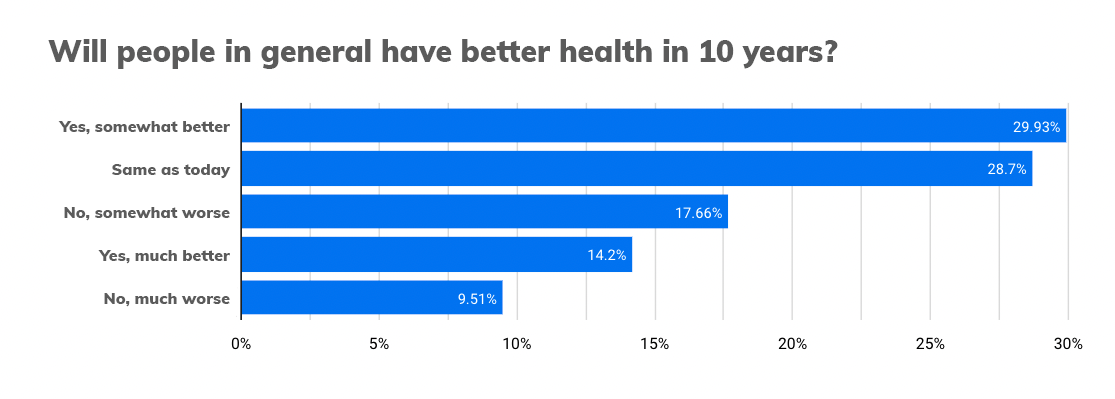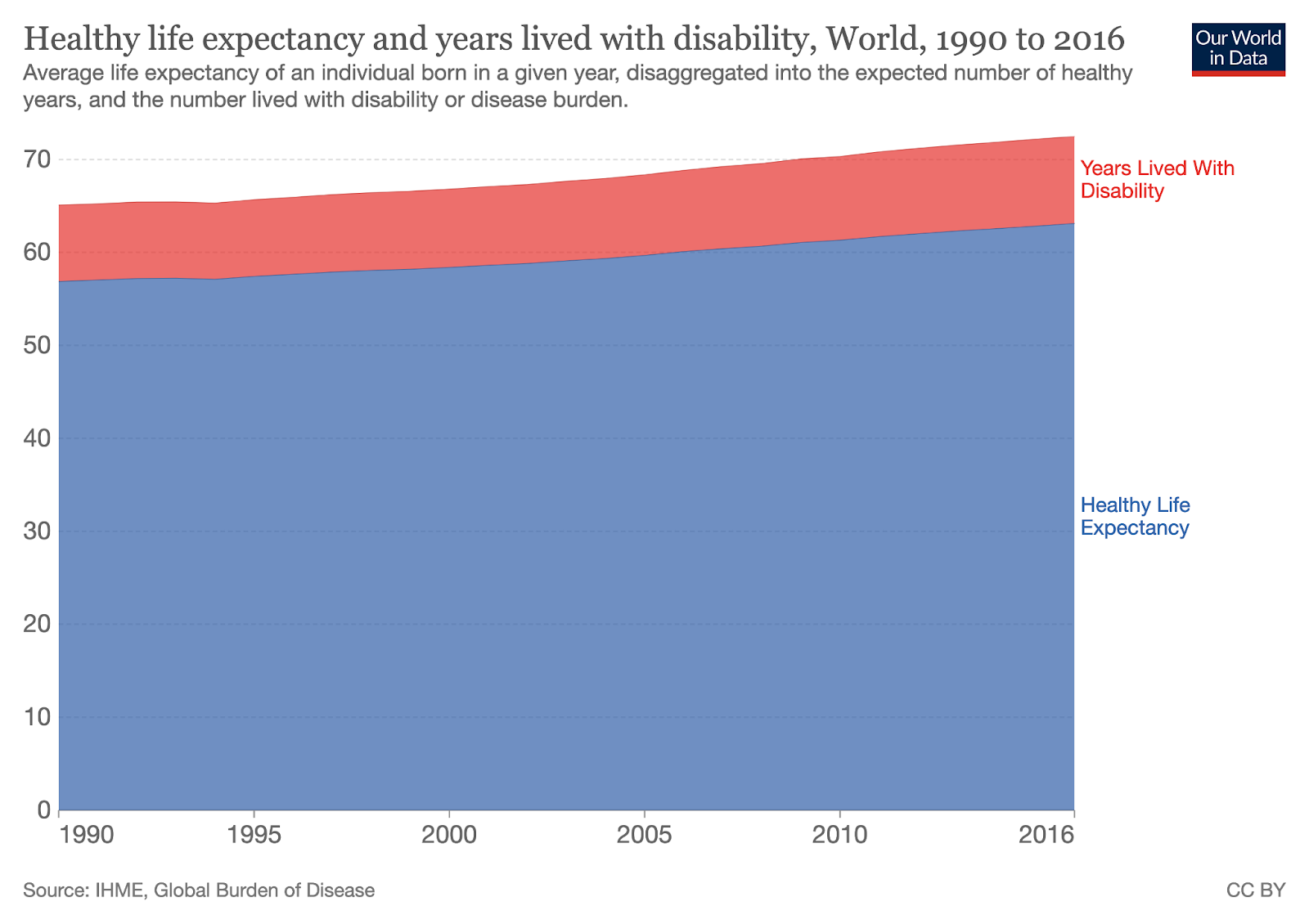
🩺 The health trend that makes us healthier in the future
Are we going to have better or worse health in the future? The short answer is, it depends. But we have a greater ability than ever to get healthier. Maria Eriksson gives you insights on how to live a longer, healthier life thanks to trends that stretch into the future.
Share this story!
Summary
📉 What people think
According to a recent survey by Warp News, about half believe that things will get better, but one in four believe that our health will be worse or significantly worse in ten years.
📈 Here are the facts
We are living longer and longer and even if it means that we also get more chronic diseases, there are more and more ways to cure and alleviate - even prevent these conditions.
💡 Optimist’s Edge
With more preventive care, people and communities can generally become healthier, which means great benefits for everyone.
👇 How to get Optimist's Edge
Take control of your own health – and the health of others. Join in and work so that more people have time to discover illnesses and diseases before they have had the time to develop. There are great opportunities to build companies, innovate and invest in preventative healthcare – instead of traditional health services.

📉 What people think
Will people, in general, have better health in ten years? According to a recent survey by Warp News, about half believe that there will be an improvement, but one in four believe that we'll have worse or significantly worse health in ten years.

📈 Here are the facts
During the last 150 years, men's and women's life expectancy has almost doubled in Sweden. Since 1980 alone, men's life expectancy has increased by almost nine years and women's by six years.
One result of this positive progress - that more and more people are getting older - is that an increasing number of people subsequently are also getting old enough to suffer from various chronic diseases. Almost half of the population has a chronic illness and a quarter have more than one. Together, they account for 80-85 percent of healthcare costs.
The diagram below shows the global average in life expectancy. As you can see, this has increased from 65 to 72 years in a quarter of a century. But what's also noteworthy is the health gap between a relatively healthy life and years lived with some type of disability or illness. Better health can mean an increased life expectancy, but also more healthy years.

It may sound gloomy, but thankfully many of these diseases can be addressed. Cardiovascular diseases, diabetes, COPD, etcetera are diseases that are largely lifestyle-related. "According to the WHO, unhealthy lifestyles cause 80 percent of all coronary heart disease and stroke, as well as 30 percent of all cancers."
In other words, there are plenty of opportunities for us to have significantly better health in the future. And technology can help. Let's take a closer look at some examples of how.
💡 Optimist’s Edge
Keep an eye on your body using portable technology. Even a regular smartphone can help you by measuring how much you move in a day. But various smartwatches, bracelets, and rings that are worn on your body can provide much more information than that: heart rate, temperature, oxygenation of the blood, sleep patterns. This data can be analyzed to tell if you are stressed, getting sick or where you are in the menstrual cycle. They can also provide insights to help you sleep, exercise and rest better. Cheaper and better sensors can also be used in medicine for, as an example, continuous glucose measurement in people with diabetes.

Greater opportunities to detect diseases early. Extensive research is underway on how we can use different biomarkers for earlier detection of diseases. For example, a simple blood test can detect an increased risk of Alzheimer's disease or various types of cancer. A recently published study at Lund University has identified a protein in the blood that may show an increased risk of developing type 2 diabetes - as early as nineteen years before the disease develops. Of course, this means much better opportunities to implement preventive measures, regardless of whether it is a matter of lifestyle changes or new drugs.
Eat better and feel better. The importance of food for health is another field of research that has gained increasing interest. Here as well, different biomarkers can be used to see, for example, what a person has eaten. Increased knowledge of how diet affects intestinal flora can also provide important insights to prevent various diseases. The so-called anti-inflammatory diet is still unclear, but studies show that it can relieve rheumatism. This is just a brief overview and we can expect many more exciting research results in the future.

Cheaper tests for private individuals. Another exciting development is that it has become cheaper and easier for private individuals to order different lab tests of blood status, different hormones, and more. For example, it provides an opportunity to detect deficiencies in various vitamins and minerals. Finally, of course, we have the entire field of genetic testing, both in healthcare and for private individuals, to forecast the risk of various conditions.
Digitized care increases accessibility. Online doctors have become increasingly common and offer several advantages, such as being able to get in touch with a doctor faster, making the care visit more efficient and avoiding infecting other patients. A lot of care can also be provided online. We're already seeing that several Swedish regions offer CBT therapy online to treat, for example, depression, panic syndrome, tinnitus, IBS, or various types of addiction-related conditions. In other words, technology can also help us get better mental health.
If we extrapolate the development described above, there are good conditions for us to have significantly better health in the future. Many of the tools that are being developed now give individuals more power to influence their own state of mind. And they make it possible to transition from reactive to proactive care, where we can prevent diseases and at best stop them from occurring, rather than just treating the symptoms.
Let's return to the figure above. 80 percent of healthcare costs go to treating chronic diseases, and a large portion of these can be alleviated or prevented completely with early detection and lifestyle changes.
Suppose we succeed in really exploiting that potential. Then a large part of what we today call healthcare can become completely redundant. The big gains, of course, lie with individuals who will feel better. But this is a development that companies and society at large can also benefit from. Chronic illness costs money both in the form of medical care and in terms of sick leave at work. In other words, a transition from healthcare to health service can save both money and human suffering.
👇 How to get Optimist's Edge
Take control of your own health:
Portable products. What do you need to keep track of your sleep and physical activity?
Lab tests. When was the last time you had a major health check-up?
Eat better and exercise. The positive thing is that the range of varied and healthy food has never been so large. The same applies to different opportunities for physical activity.
Develop the health care of the future:
It is said that the healthy have many desires, the sick only one. There are few things that we value so highly as to feel good. This is also reflected in the fact that healthcare ends up at the top when voters are asked which political issue they consider to be most important. Add this to the research advances mentioned above and there will be a great demand for modern healthcare. Maybe you'll be the one who comes up with a concept for the health clinics of the future, where you go to get a comprehensive review of the body and instead of medicine get tailored prescriptions for exercise and food that help you feel better? Of course, there are opportunities here for investors, but also for you who want to work in the health field, regardless of whether it is as a doctor, nutritionist, personal trainer, health coach, or lab analyst.
Proactive efforts at companies and in society at large:
Proactive health interventions can be perceived as a cost, but save money in the long run. Today, for example, stress corresponds to 14 percent of all sick leave in Sweden. Reducing the risk of stress and burnout in various ways through measures in the workplace can result in both fewer sick leaves and better performance. What can you, as an employer, do to help your employees improve their health? Even at the societal level, there is a lot of money to be saved if people feel better. Not least because an aging population is expected to require more care resources. A key question for decision-makers at various levels is this: How can we redirect public care from a healthcare system that treats symptoms, to a health service system that prevents people from becoming ill?
Don't wait, join us on the path to the future. When one in four thinks we are heading for a darker time in terms of health, you can be an agent of change who makes a difference. Maybe as a health communicator?
Facts:
- The global life expectancy is 72.6 years (2019)
- By 2050, it is expected to have increased to 77.1 years
- Child mortality has fallen sharply in the world: from 1960 to 2017, the proportion of children who died before the age of five decreased from 19 percent to 4 percent.
- As we get older, chronic diseases have become an increasing problem: 1 in 3 adults worldwide has at least two chronic diseases
Source: UN, World Population Prospects 2019
WEF: This is the biggest challenge to our health
Read more:
Better care when AI creates meaning in large amounts of data
The lung disease COPD has been halved in 15 years
The number of people in Sweden who die of heart attacks has halved since 2002
Researchers are discovering biomarkers found in half of all cancers
Imagination and technological development pave the way for a revolution in healthcare
An active lifestyle reduces the risk of dying from cardiovascular disease by 21 percent
❓What else can you do?
Feel free to share more ideas with other Premium Supporters in our Facebook group.
By becoming a premium supporter, you help in the creation and sharing of fact-based optimistic news all over the world.


